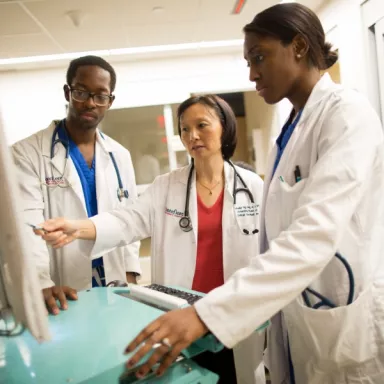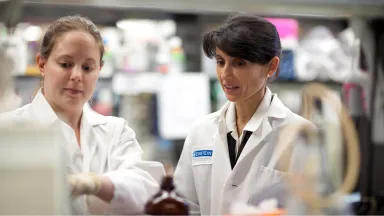
Cristina Montagna, Ph.D.
- Adjunct Professor, Department of Genetics
- Adjunct Professor, Department of Pathology
- Faculty Advisor, Molecular Cytogenetics Core, Department of Genetics
Location
- Rutgers University 195 Little Albany Street CINJ Building 2013 New Brunswick, NJ 8901
Research Profiles
Professional Interests
The laboratory focuses on three main areas of research:
Project 1- Role of Septin 9 in Breast Carcinogenesis.
A comparative cytogenetic approach aimed to identify recurrent DNA copy number variations in a panel of murine models for breast cancer resulted in the identification of Septin 9 (Sept9) as potential novel oncogene. The septin family of genes codes for a highly redundant and conserved family of GTP-binding proteins that assemble into filaments and bind to microfilaments and microtubules. Our recent data performed on a panel of human primary tumors revealed that Sept9 is also amplified and over expressed in human tumors. At the locus of genomic amplification deregulation of Sept9 expression occurs by a complex pattern of genetic and epigenetic alterations affecting several Sept9 isoform variants. Our hypothesis is that during malignant transformation, breast epithelial cells undergo genomic amplification of the Sept9 locus and over-express Sept9 mRNA and protein. Additionally, aberrant cytosine methylation occurs at specific alternative promoters within the Sept9 locus resulting in an abnormal pattern of Sept9 isoform variants. We are currently studying how the expression of various Sept9 isoforms is regulated in normal and cancer cells and the functional differences between these isoforms.
Project 2- Stage- and Cell Subtype-Specific Epigenetic Regulation of Mammary Gland Development and breast tumorigenesis.
We are interested in investigating the DNA methylation changes occurring in the development of the normal mammary gland during puberty, adult age, pregnant, lactating and undergoing mammary gland involution. This approach has the final goal of dissecting the molecular processes that mediate methylation changes in the morphogenesis and differentiation of the normal breast and to identify “hot spot” loci for gene silencing in breast carcinogenesis.
We performed a genome-wide methylation analysis of cytosine methylation levels during mammary gland development to identify novel candidate loci. This study shows that conserved, non-coding regions around the transcription start sites of a number of genes undergo changes in methylation pattern during mammary gland development. We have selected various candidates that we are currently investigating for their role in determining cell fate during mammary gland development and for their implication in breast tumorigenesis.
Project 3- Aneuploidy in aging.
Polyploidy and aneuploidy are the most frequent cytogenetic events observed in mammalian cells. Polyploidization is a widely accepted mechanism for increasing genetic variation in unicellular organisms and for the acquisition of new properties in a variety of cell types (e.g., osteoclast fusion in bone resorption and myoblast fusion in muscle development) and is considered a physiological process. Aneuploidy on the contrary is linked to pathological states. It is a hallmark of spontaneous abortions and birth defects and is observed virtually in every human tumor. While the catastrophic consequence of high levels of aneuploidy observed in abortions is self-explanatory, the role of aneuploidy under physiological conditions is a question waiting for answers. The major goal of this project is to explore a possible correlation between age-associated genome instability in a variety of tissues and functionality of these cells. We hypothesize that during aging genomic instability measured as frequency of whole chromosomes aneuploidy increases. Consequently, the cumulative effect of aging-associated genome instability may lead to cellular dysfunction and organ and tissue degeneration.
Selected Publications
Acosta, D., M. Suzuki, D. Connolly, R. F. Thompson, M. J. Fazzari, J. M. Greally and C. Montagna (2011). "DNA methylation changes in murine breast adenocarcinomas allow the identification of candidate genes for human breast carcinogenesis." Mammalian genome : official journal of the International Mammalian Genome Society 22(3-4): 249-259.
Connolly, D., I. Abdesselam, P. Verdier-Pinard and C. Montagna (2011). "Septin roles in tumorigenesis." Biological chemistry 392(8-9): 725-738.
Connolly, D., Z. Yang, M. Castaldi, N. Simmons, M. H. Oktay, S. Coniglio, M. J. Fazzari, P. Verdier-Pinard and C. Montagna (2011). "Septin 9 isoform expression, localization and epigenetic changes during human and mouse breast cancer progression." Breast cancer research: BCR 13(4): R76.
Downing, T. E., M. H. Oktay, M. J. Fazzari and C. Montagna (2010). "Prognostic and predictive value of 16p12.1 and 16q22.1 copy number changes in human breast cancer." Cancer genetics and cytogenetics 198(1): 52-61.
Faggioli, F., M. G. Sacco, L. Susani, C. Montagna and P. Vezzoni (2008). "Cell fusion is a physiological process in mouse liver." Hepatology 48(5): 1655-1664.
Faggioli, F., P. Vezzoni and C. Montagna (2011). "Single-cell analysis of ploidy and centrosomes underscores the peculiarity of normal hepatocytes." PloS one 6(10): e26080.
Faggioli, F., J. Vijg and C. Montagna (2011). "Chromosomal aneuploidy in the aging brain." Mechanisms of ageing and development 132(8-9): 429-436.
Weaver, B. A., A. D. Silk, C. Montagna, P. Verdier-Pinard and D. W. Cleveland (2007). "Aneuploidy acts both oncogenically and as a tumor suppressor." Cancer Cell 11(1): 25-36.





